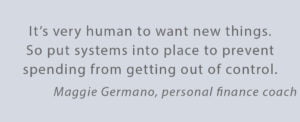
College Graduates Cope with Money
College upperclassmen and recent graduates have a lot on their minds. One thing they don’t always like to think too hard about is money.

But Maggie Germano, a financial coach, encourages them to get things out in the open and talk about it. At a recent personal finance session here at Boston College, she answered students’ questions about their credit ratings, student loans, and how to avoid spending money they do not have.
Here are the five best tips from Germano, a 2009 graduate of the State University of New York in Fredonia. She now lives in Washington D.C.
Pay attention. The first step to getting control of one’s finances is to pay attention to them, she said. Not dealing with credit card bills and student loan statements doesn’t make the problems go away. “The opposite is true: the more you pay attention, the more in control you’ll be,” she said.
Get a credit rating – or fix it. The key is to have a credit card but use it judiciously. Germano advises young adults to get what’s known as a secured credit card with a low spending limit – say $500. Secured credit cards typically require users to put up a cash deposit. To slowly establish a sound credit history, spend no more than 30 percent of the card’s limit and pay it off at the end of each month.
Student loans are hard work. Germano said that, after she graduated, her rent and student loan payments equaled all of her income. She signed up for the federal government’s income-based repayment program. In this program, the government reduces the payments to reflect the low incomes many recent graduates are earning at the start of their careers. Germano said she paid off her $26,000 loan balance off about four years ago.

The secret to not overspending. She learned this trick from a client. Set up two separate checking accounts. One account is for paying monthly bills – rent, Netflix, electricity – and the payments are deducted automatically. For all other spending, use a second account with a debit card and “don’t touch” the money in the first account. Using a debit card for discretionary expenses makes it easy to keep track of how much is left to spend each month – maybe it’s better to walk than take another Uber.
“It’s very human to want new things, be social, and spend money you’ve never had before,” she said. So put “systems into place that will prevent [that] from getting out of control.”
Goals. As is true for careers, relationships, and vacation destinations, managing money requires setting goals. Choose the goals that are most important to you, and don’t be influenced by what friends are doing.
Once the right steps are in place, be patient and flexible. “Maybe you can’t do all of [your goals] at the same time but a little here or there,” she said. These “priorities will shift over time,” she added.
Squared Away writer Kim Blanton invites you to follow us on Twitter @SquaredAwayBC. To stay current on our blog, please join our free email list. You’ll receive just one email each week – with links to the two new posts for that week – when you sign up here. This blog is supported by the Center for Retirement Research at Boston College.






